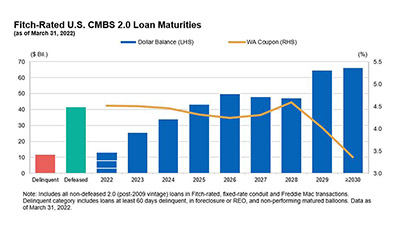
Fitch: Retail Resolutions Drive May U.S. CMBS Loan Delinquency Rate Lower

Fitch Ratings, New York, reported the U.S. commercial mortgage-backed securities delinquency rate fell by 22 basis points to 2.10% in May, amid strong retail resolution volume and robust new issuance.
Fitch said resolutions totaled $1.4 billion in May, more than double the $604 million total in April, consisting primarily of retail (59%; $822 million) and hotel (19%; $258 million) loans/assets. New delinquencies of $335 million in May remained low, compared to $295 million in April. May’s 30-day delinquency volume dropped to $631 million from $914 million in April. Fitch-rated new issuance volume of $8.2 billion (seven transactions) in April contributed to a higher index denominator.
Fitch said 3.5% of its rated U.S. CMBS universe ($19.2 billion; 742 loans) was in special servicing as of the May remittance, down from 3.6% ($19.6 billion; 770 loans) in April. It said 41% by balance ($7.8 billion; 237 loans) are performing, specially serviced loans.
Current and previous delinquency rates are as follows:
–Hotel: 6.38% (from 6.75% in April);
–Retail*: 5.68% (6.76%);
–Mixed Use: 2.52% (2.50%);
–Office: 1.32% (1.31%);
–Multifamily**: 0.32% (0.33%);
–Industrial: 0.20% (0.20%);
–Other: 0.66% (0.77%).
*Regional Malls: 9.17% (11.36%).
**Student Housing: 1.41% (1.18%).
Five regional mall loans were removed from Fitch’s index last month: two were dispositions, two were brought current from trapped/excess cash and one was modified.
–The $154 million Mall St. Matthews loan ($121 million in Fitch-rated GSMS 2013-GC13, $33 million in non-Fitch-rated GSMS 2013-GC14; Louisville, Ky.; sponsored by Brookfield Properties) was modified, with a maturity extension to June 2025 and payments converted to interest-only for the remainder of the term. The borrower also contributed $7 million of new capital.
–The $94.5 million Emerald Square Mall loan (COMM 2012-CCRE3, COMM 2012-CCRE4; North Attleboro, Mass.; Simon Property Group) disposed with a 63% loss on the original $115 million balance.
–The $68.4 million Parkdale Mall & Crossing loan (GSMS 2011-GC5; Beaumont, Texas; CBL) was reported as performing matured (previously in foreclosure).
–The $42.6 million Bayshore Mall loan ($21.5 million in Fitch-rated CSAIL 2015-C1, $21.1 million in non-Fitch-rated CSAIL 2015-2; Eureka, Calif.; Brookfield) was brought current (previously 90+ days delinquent).
–The $43.3 million Starwood National Mall Portfolio loan (MSC 2015-XLF2; Starwood) disposed with an 11% loss on the original $161 million balance after the two remaining properties, Fairlane Town Center (Dearborn, Mich. and Shops at Willow Bend (Plano, Texas), were sold in May. A third asset, Shops at Stony Park (Richmond, Va.), had sold in April.
The largest new delinquency, the $95 million 95 Morton Street loan (CD 2017-CD4), defaulted at its May maturity. The loan, secured by an office building located in the West Village neighborhood of Manhattan, transferred to special servicing in April for imminent monetary default. Occupancy declined to 79% in September 2021 after Xerox vacated at its September 2020 expiration and VSA Partners ceased operations and vacated.
In a separate report, Fitch said the limited number of master servicers available to support U.S. CMBS could constrain the market, increase transaction costs and potentially limit or disrupt servicing continuity should an existing participant exit or stop accepting new assignments.
Fitch noted two to four servicers currently providing master servicing functions depending on the transaction type, which Fitch views as sufficient to support a healthy CMBS market. Securitized transactions designate a trustee to provide backup advancing, but trustees do not have the operational capacity to assume all master servicing functions.
“Because there are fewer master servicers, they are able to potentially adjust servicing fees on new issue transactions quickly to address increased servicing costs, including employee costs,” Fitch said. “A reduction in master servicers may result in higher servicing costs for new transactions, which could reduce issuer margins or increase transaction fees.”
Currently, there are three active master servicers for multi-borrower conduit transactions. Wells Fargo and PNC Bank have received the majority of assignments since 2020; KeyBank, PNC and Wells Fargo were largely equal in receiving new assignments. However, all of Wells Fargo 2022 multi-borrower conduit assignments are for WFCM and BANK transactions to which it contributes loans, and it does not appear to pursue the servicing for transactions from other issuers.
“If this trend continues, only PNC and KeyBank would be available to service non-Wells Fargo transactions,” Fitch said. “Any pullback from one could leave issuers with only one potential master servicer.”
Fitch noted master servicing for multi-borrower transactions has among the highest barriers to entry of any of the CMBS transaction types, as servicing rights are purchased prior to closing. Servicers purchase a fee strip of 50 basis points or less, and receive ancillary fee income from borrower requests, as well as float income from reserve balances. Multi-borrower master servicing is largely concentrated among national or regional banks, given the operational infrastructure required to administer collateral pools, with income derived from fee-generating deposits.
Single-family rental transactions, secured by residential homes utilized as rental properties, have only two active master servicers. PNC Bank has serviced 87% of SFR transactions issued since 2020. Berkadia, which only entered the SFR master servicing market in 2020, was named master servicer for seven CoreVest transactions.
